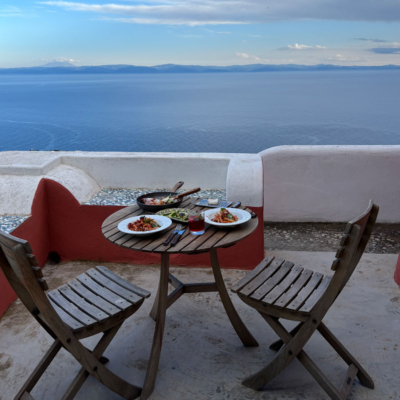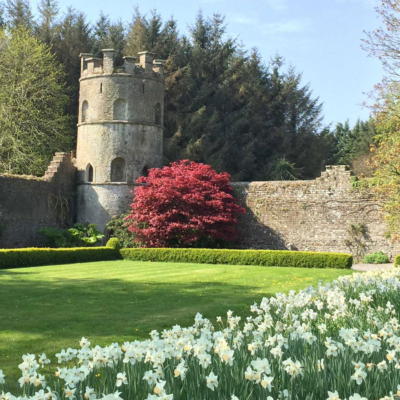How long does it take me to move on from the guilt? A few seconds pause after reading a Fiona Harvey column on ocean warming or watching An Inconvenient Sequel? I will be haunted by it later but does it hold me for a full, whole, present minute?
We’re good at letting ourselves off the hook, me especially. Sure, I’m much more environmentally friendly at eating than traveling – I know my onions, and that lecturing me from a free-range high horse eating avocados and drinking nut “milk” while telling others to sail everywhere isn’t sustainable. That’s not the point though.
I tell myself that air travel is under three per cent of the problem (disclaimer – this is an overseas travel column and not a climate change op-ed) but I know that’s flying supersonically in the wrong direction. I’m trying to be a less frequent flyer but spending months of the year in other countries, continents and hemispheres might disqualify me from this conversation. I travel too much but even if I didn’t have to do it for work, I’d do it anyway. Other countries’ cultures are an addiction not an option.
I tell myself that I can offset my flight for the price of a pint by pressing the carbon offset button. Airlines love us ticking that confessional box to offset the guilt yet these offset programmes are complicated. Some are decent, others feel like agreeing to pay for someone’s surgery if they let you shoot them.
Eco travel still sounds like a holiday in a treehouse with a bottle of non-eco mozzie spray.
Trying to change is hard, unless you are the climate. Forming new habits is better. There’s a part of your brain that sounds like a Star Trek character called the basal ganglia. Let’s call it the BG (disclaimer – this is also not a medical column). The BG is where you magically form and store habits. The BG is the home of the reflex decisions you make in response to a trigger, eg when you sit down to watch TV and think of biscuits with your tea. TV is the trigger, biscuits the reward. Know the trigger and you can change the reward. It’s a good model for losing weight but I need to upload new habits to my BG too to ensure that every time I see Greta Thunberg or David Attenborough’s face – superheroes both – or any number of burning marsupials or starving bees and bears, I automatically do something, however small. Doing something is better that nothing or panicking at not doing everything. A little thing – turn something off, donate, support someone with a click, buy a train ticket instead of driving, stop buying things, anything.
From a travel perspective you want to look out for “greenwashing”, not a new climate term, it’s a corporate sleight of hand that’s been around since Reagan was president, with the notion that saving the towel might save the world.
Names are part of the problem. Eco travel still sounds like a holiday in a treehouse with a bottle of non-eco mozzie spray. Green travel sounds regimental or nationalistic. Responsible or slow travel sounds better. Education is best. Some hotel and travel operators are doing more because they have to, but this is a big picture problem so here’s one hotel, a city and a country that are already on the road to a future we can actually think of.

A COUNTRY
South America’s smallest country seems to have a golden compass for sustainability that eludes the rest of the world. Uruguay also has everything worth travelling for – not touristy, with beaches, whales and wineries, a sophisticated Art Deco capital, super-liberal political climate, with 95 per cent of its electricity and half of all of its energy including transport coming from diverse renewable sources. If you are going to go all that way to learn about what the world can do, then you need to put your feet up somewhere nice, like for example Playa Vik perched on the dunes of La Mansa beach in José Ignacio. www.tablethotels.com

A HOTEL
There are hotel groups like 1 Hotels that seem to have their green heart in the right place but anyone who reads this column will be familiar with its obsession with the Iberian coast that runs from Portugal down to Jerez de la Fontera. Here mountains meet beaches, the best value wines in the world meet the best ham, and all with lovely year-round weather. Near Ronda at the top of the Serranía de Rona there is a slow-mo view of travel and food in the beauty that is La Donaira, a 15th-century, whitewashed Andalusian farmhouse, with an equestrian centre, spa, gardens and organic farm all surrounded by 1,500 mountain acres of things that are good for your eyes, tummy and soul. www.ladonaira.com

A CITY
Reykjavik is one of the greenest cities in the world, but it’s expensive and cold. Copenhagen set a goal to become carbon free by 2025 and doesn’t need the headstart of being fuelled by volcanoes. Every tenth meal sold in Copenhagen is apparently organic. I’m there every few months and it’s like looking at a better version of yourself. The weather is worse than here but bikes come first, cars second, and the endorphins of daily outdoor spinning classes might be why most people seem so lovely. You can also offset the airmiles to Mexico by having the best Mexican food outside of it in Sanchez. The nearest aspiring Copenhagen to us is handsome Bristol. Like the Danish capital, England’s first cycling city has more than a cool bridge and a brilliant restaurant scene that includes a decent sustainable fast food chain, Friska. It has a green plan that Dublin can only dream of, and the eponymous Bristol Hotel is, like any good hotel, working hard to be more sustainable every day. www.doylecollection.com
LOVETHEGLOSS.IE?
Sign up to our MAILING LIST now for a roundup of the latest fashion, beauty, interiors and entertaining news from THE GLOSS MAGAZINE’s daily dispatches.










